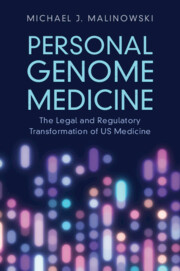Book contents
- Personal Genome Medicine
- Personal Genome Medicine
- Copyright page
- Dedication
- Contents
- Reader’s Note
- Acknowledgments
- Prologue
- 1 Medical Profession Sovereignty to Protect and Promote the Science and Evidence Base of US Medicine
- 2 US Integration of Government, Academia, and Industry
- 3 Direct-to-Consumer/DTC and Direct-to-Physician/DTP Biopharma Marketing in the US
- 4 The Evolution of Consumer Genetic Testing Services from Oncormed, Inc. to 23andMe Holding Co.
- 5 Vulnerability of the Science and Evidence Base of US Medicine
- 6 A Warning Label for Direct-to-Consumer/DTC Genetics and Genomics
- 7 Protecting and Promoting the Evidentiary-Science Base of Personal Genome Medicine/PGM
- Epilogue
- Index
5 - Vulnerability of the Science and Evidence Base of US Medicine
Published online by Cambridge University Press: 30 August 2023
- Personal Genome Medicine
- Personal Genome Medicine
- Copyright page
- Dedication
- Contents
- Reader’s Note
- Acknowledgments
- Prologue
- 1 Medical Profession Sovereignty to Protect and Promote the Science and Evidence Base of US Medicine
- 2 US Integration of Government, Academia, and Industry
- 3 Direct-to-Consumer/DTC and Direct-to-Physician/DTP Biopharma Marketing in the US
- 4 The Evolution of Consumer Genetic Testing Services from Oncormed, Inc. to 23andMe Holding Co.
- 5 Vulnerability of the Science and Evidence Base of US Medicine
- 6 A Warning Label for Direct-to-Consumer/DTC Genetics and Genomics
- 7 Protecting and Promoting the Evidentiary-Science Base of Personal Genome Medicine/PGM
- Epilogue
- Index
Summary
In the years following FDA approval of direct-to-consumer, genetic-health-risk/DTCGHR testing, millions of people in the US have sent their DNA to companies to receive personal genome health risk information without physician or other learned medical professional involvement. In Personal Genome Medicine, Michael J. Malinowski examines the ethical, legal, and social implications of this development. Drawing from the past and present of medicine in the US, Malinowski applies law, policy, public and private sector practices, and governing norms to analyze the commercial personal genome sequencing and testing sectors and to assess their impact on the future of US medicine. Written in relatable and accessible language, the book also proposes regulatory reforms for government and medical professionals that will enable technological advancements while maintaining personal and public health standards.
Keywords
- Type
- Chapter
- Information
- Personal Genome MedicineThe Legal and Regulatory Transformation of US Medicine, pp. 202 - 298Publisher: Cambridge University PressPrint publication year: 2023

